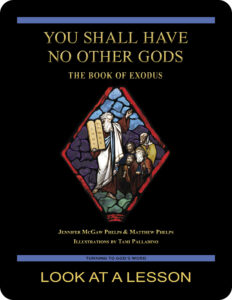exodus
 The Gospel According to Luke 9:28–36 (NABRE) depicts Jesus’ transfiguration on the mountain and his conversation with Moses and Elijah, who describe Jesus’ coming Passion, death, and Resurrection as his exodus. This description calls us to connect this act of Jesus with the Exodus of the Old Testament, though at first glance it doesn’t look terribly similar.
The Gospel According to Luke 9:28–36 (NABRE) depicts Jesus’ transfiguration on the mountain and his conversation with Moses and Elijah, who describe Jesus’ coming Passion, death, and Resurrection as his exodus. This description calls us to connect this act of Jesus with the Exodus of the Old Testament, though at first glance it doesn’t look terribly similar.
The Greek word ἔξοδος (exodos) comes from the word for road and literally means “road out.” Extending from this sense, it also can mean departure or death. We see in this passage, then, an intentional pun. Moses and Elijah are indeed speaking of Jesus’ departure from this earth, but at the same time, they intend to call to mind the departure of the people of Israel from the land of Egypt in a way they would know better than most.
At the time of Moses, the Israelites were slaves. Through their exodus, Moses led them out of slavery. After 40 years wandering in the wilderness they ultimately came to a land overflowing with milk and honey, and God made this land their own. We likewise are slaves on this earth. Through his Passion and death, Jesus offers us a way out of that slavery, but the way is not immediate. We first must wander through this wilderness that is not our home until we have purged ourselves of the influences of this world. Then and only then can we come to possess the true land of our promise, the kingdom of heaven.
you also may like our study of the book of Exodus
 You Shall Have No Other Gods: The Book of Exodus, a 28-lesson Catholic Bible study with an imprimatur, provides an in-depth look at how significant events in biblical history that occurred thousands of years ago to descendants of Jacob remain relevant and even critical for present-day Christians to understand. The deliverance of the Hebrews from slavery in Egypt and the giving of Ten Commandments are examined along with the development of Moses’ relationship to God. Click on the book’s cover to view a sample lesson.
You Shall Have No Other Gods: The Book of Exodus, a 28-lesson Catholic Bible study with an imprimatur, provides an in-depth look at how significant events in biblical history that occurred thousands of years ago to descendants of Jacob remain relevant and even critical for present-day Christians to understand. The deliverance of the Hebrews from slavery in Egypt and the giving of Ten Commandments are examined along with the development of Moses’ relationship to God. Click on the book’s cover to view a sample lesson.
 Click on the picture of the statue of Moses with horns (above) to learn more about Lost in Translation. A new entry is archived each Monday. Contact us to receive Lost in Translation by email every week. You may use any of the contact links on our website to ask Matthew a question.
Click on the picture of the statue of Moses with horns (above) to learn more about Lost in Translation. A new entry is archived each Monday. Contact us to receive Lost in Translation by email every week. You may use any of the contact links on our website to ask Matthew a question.
